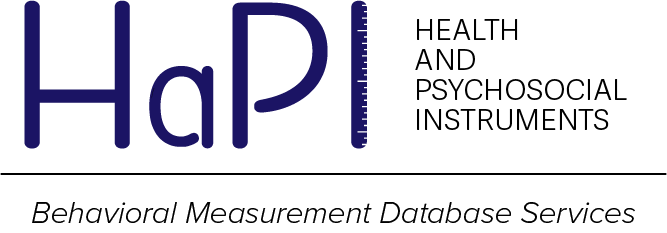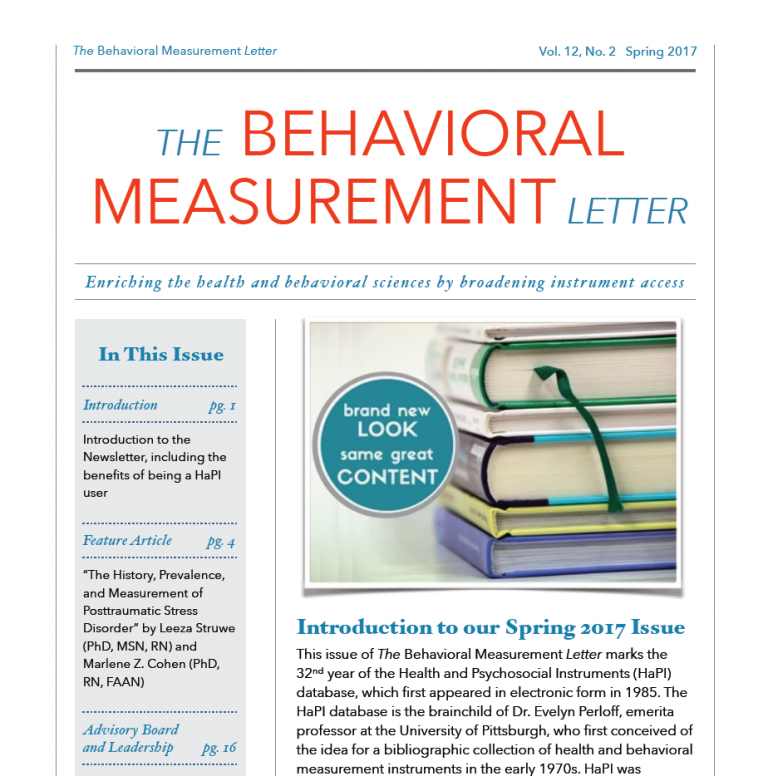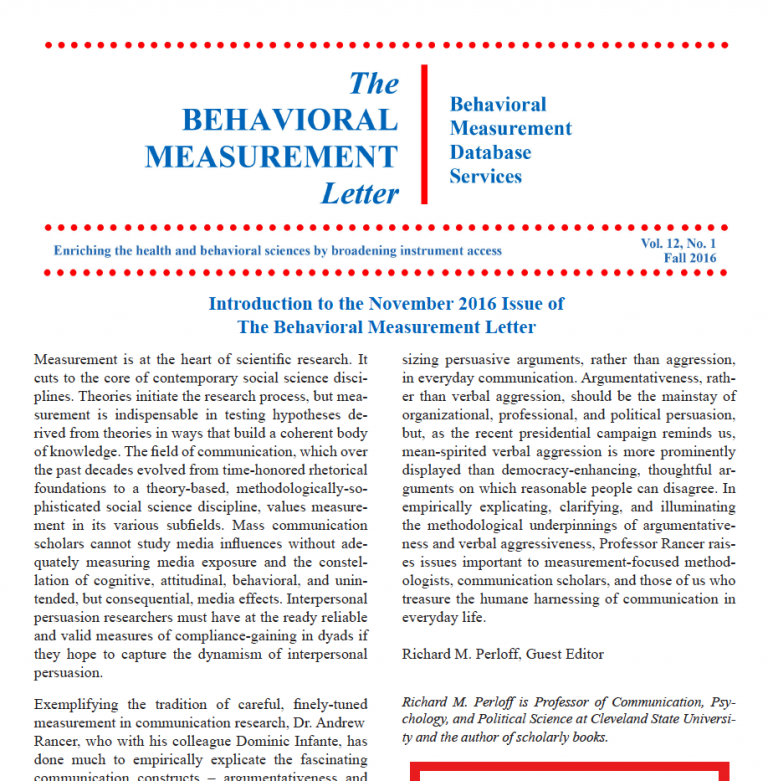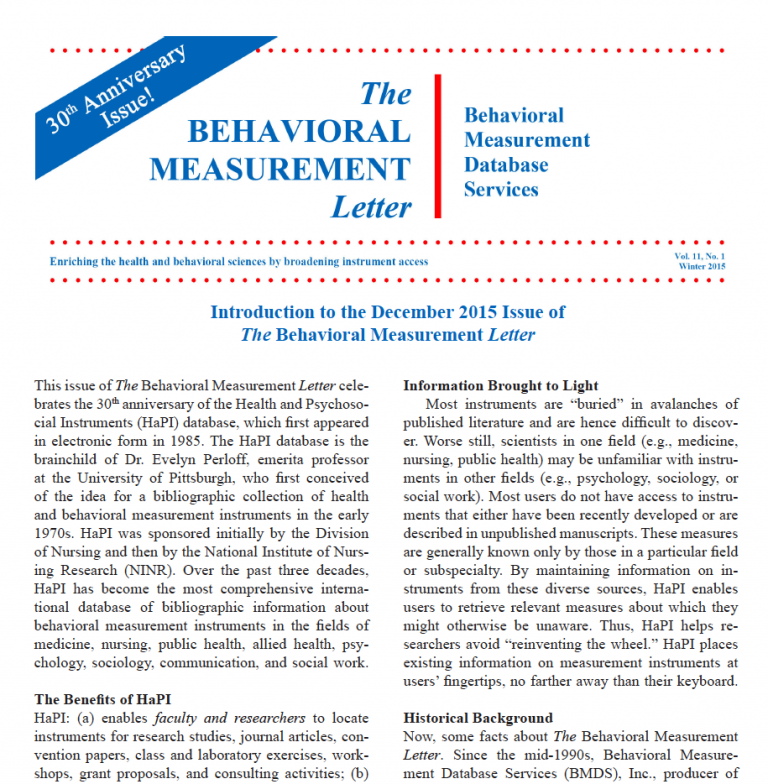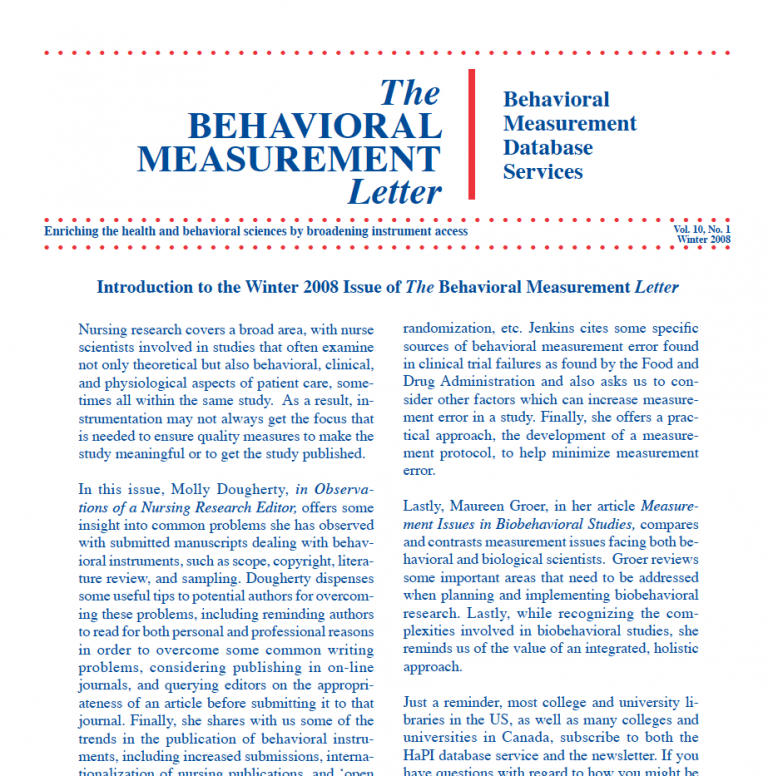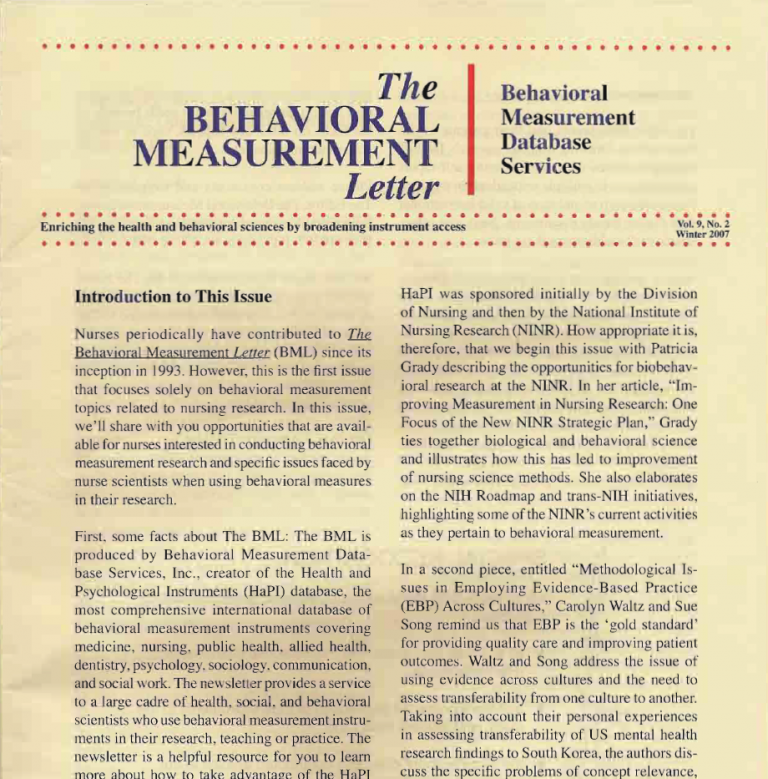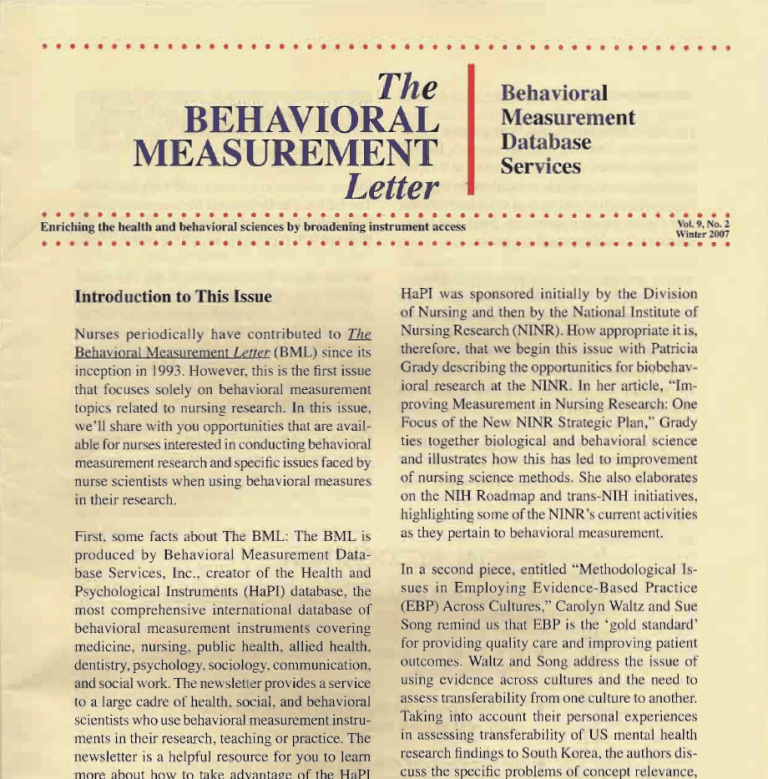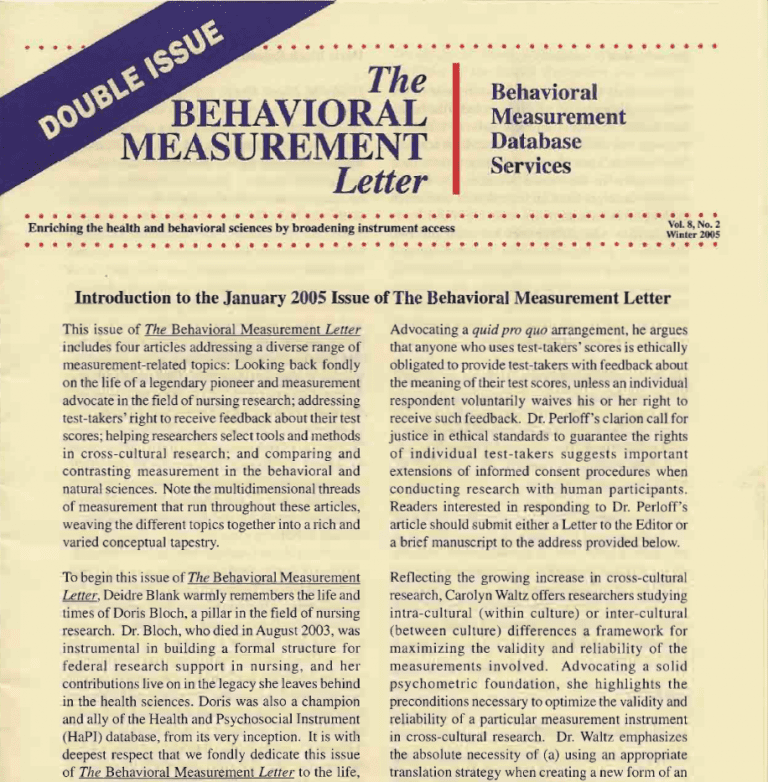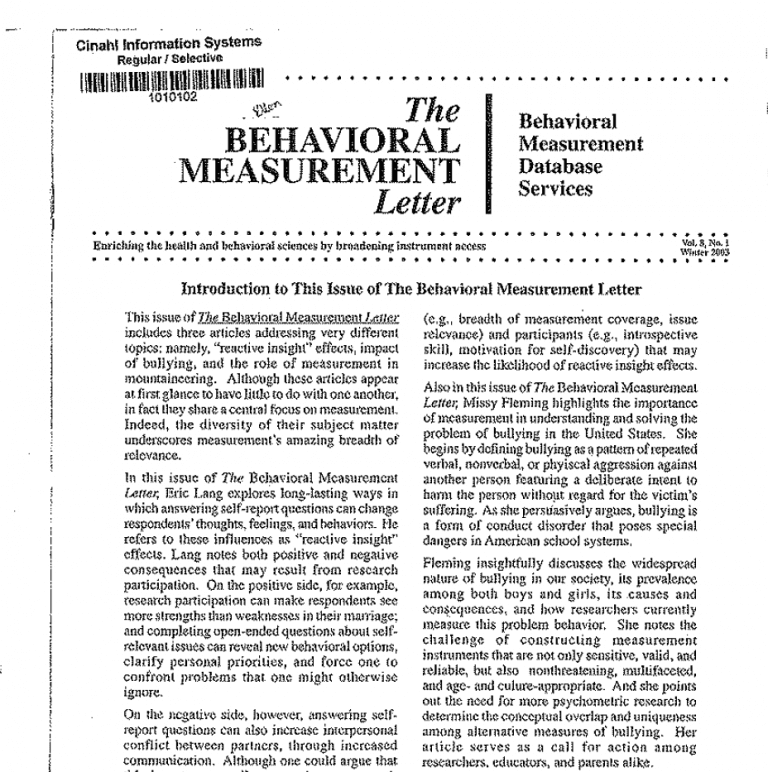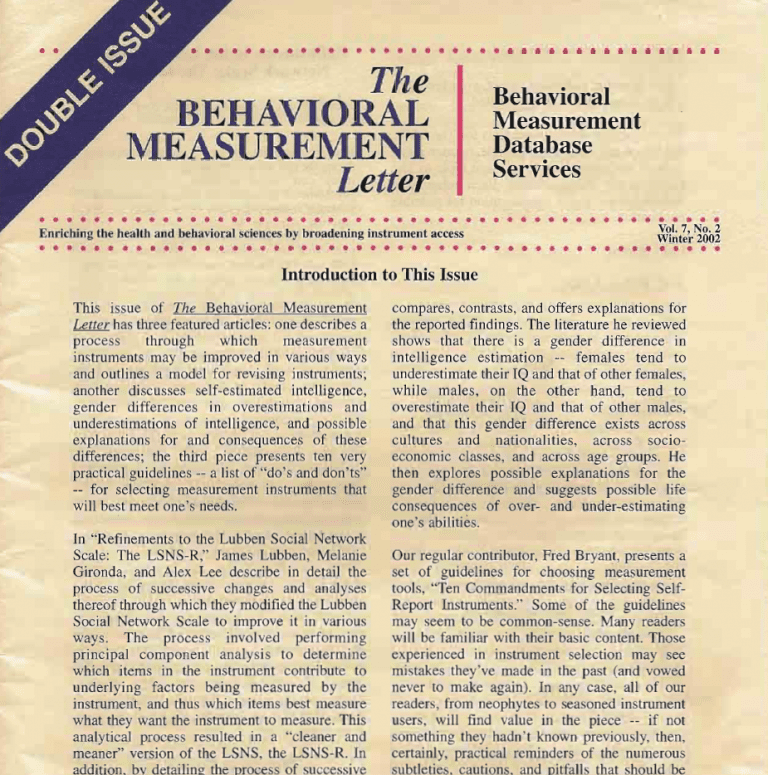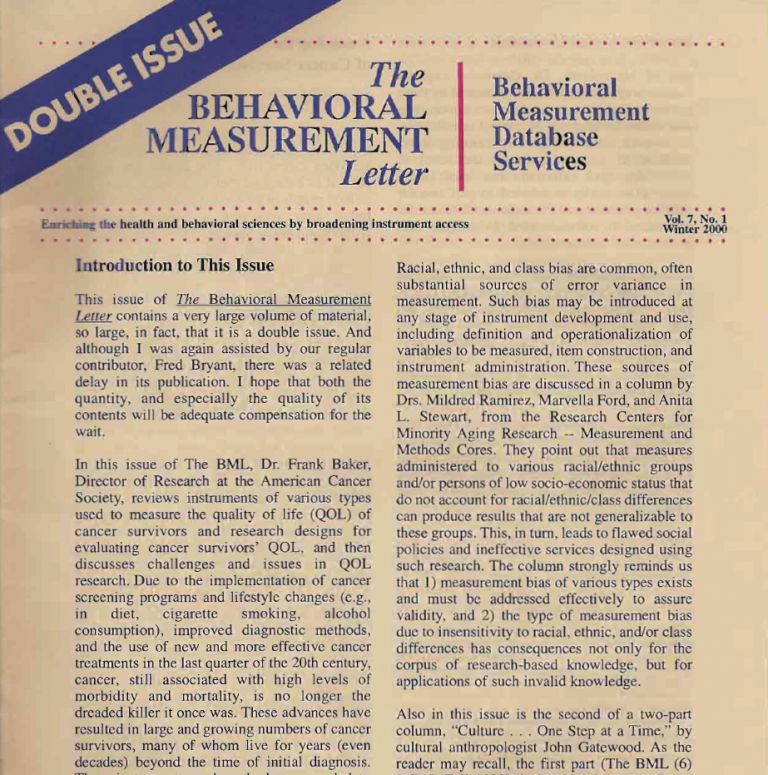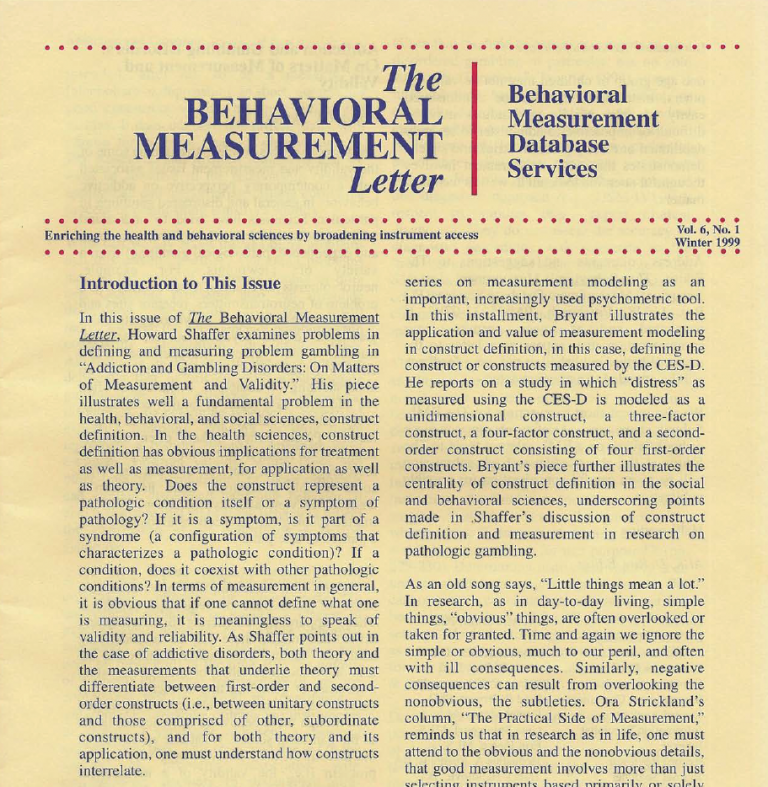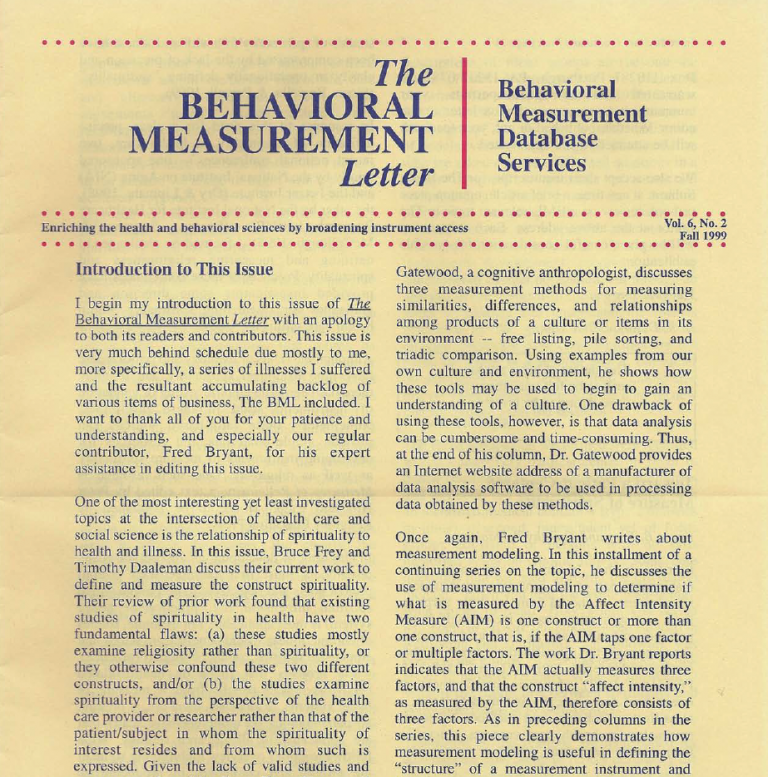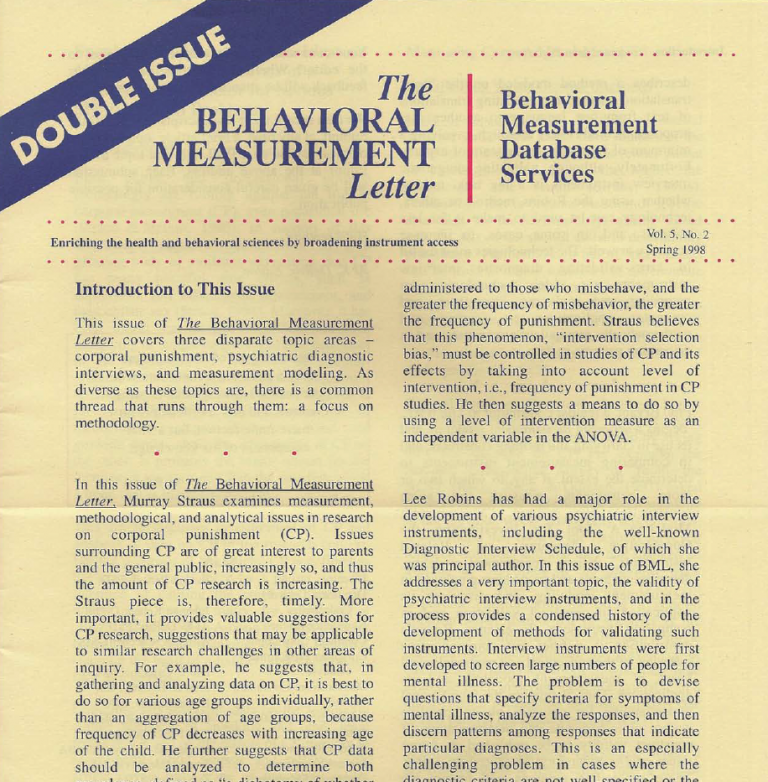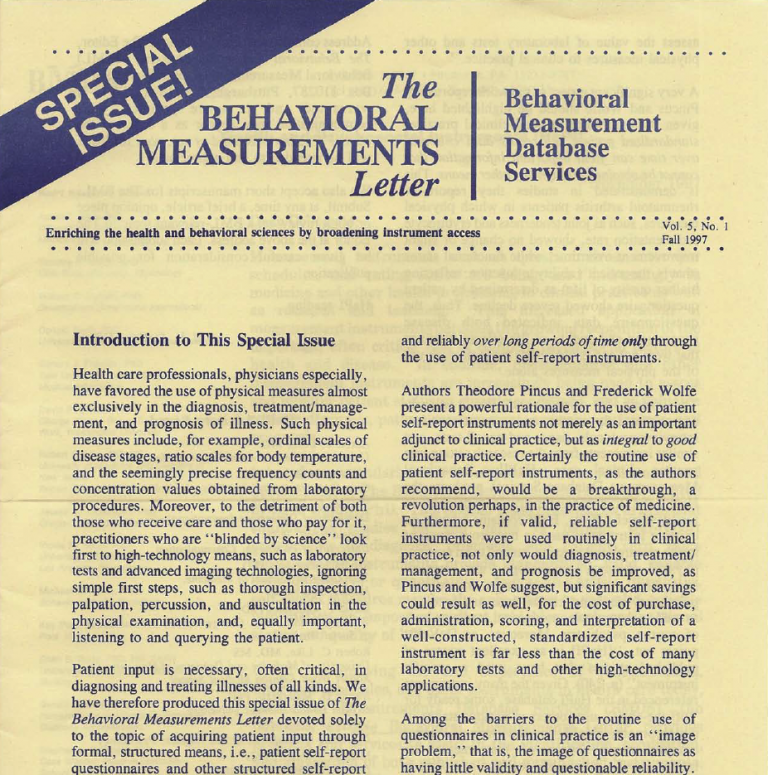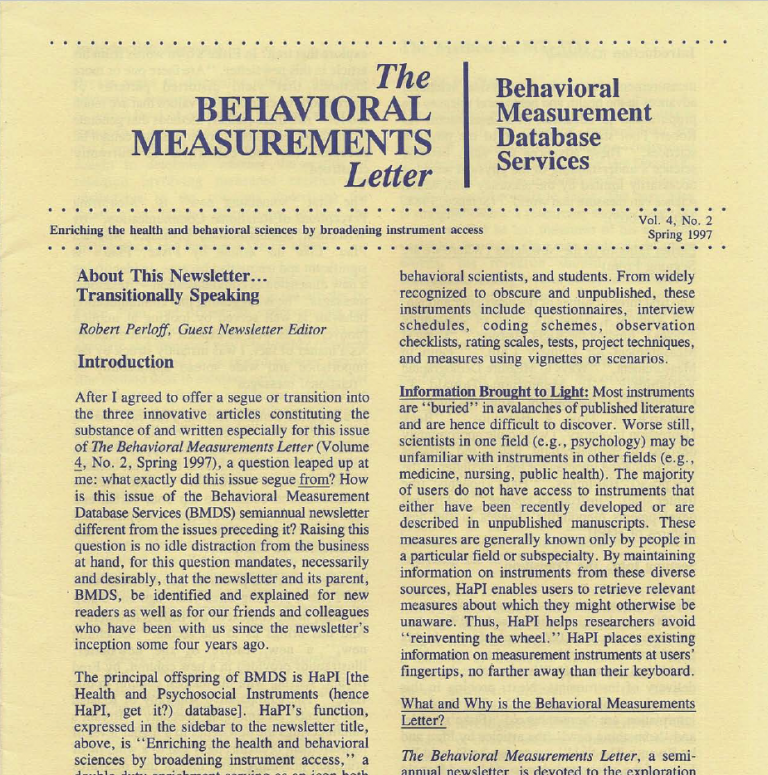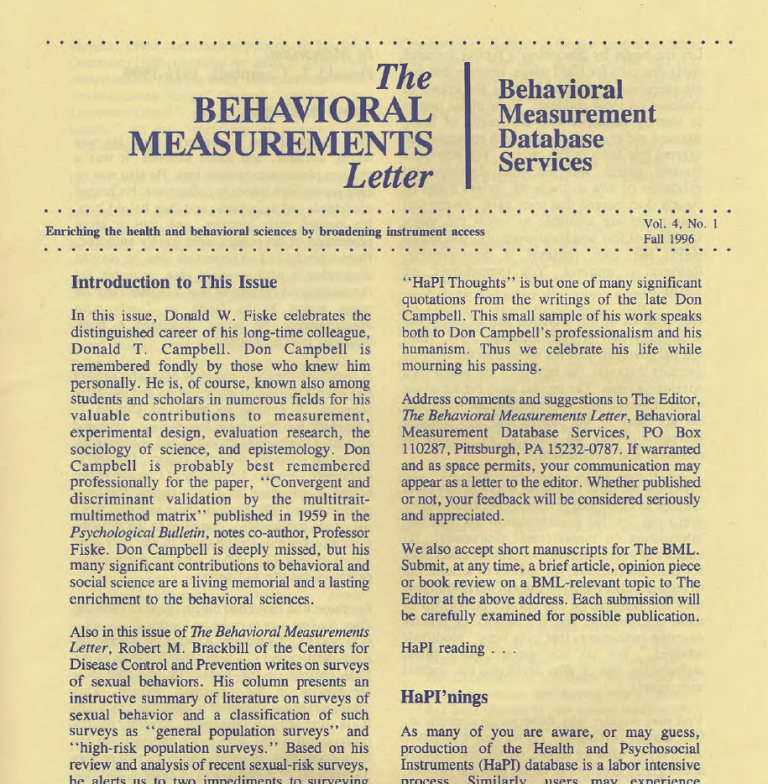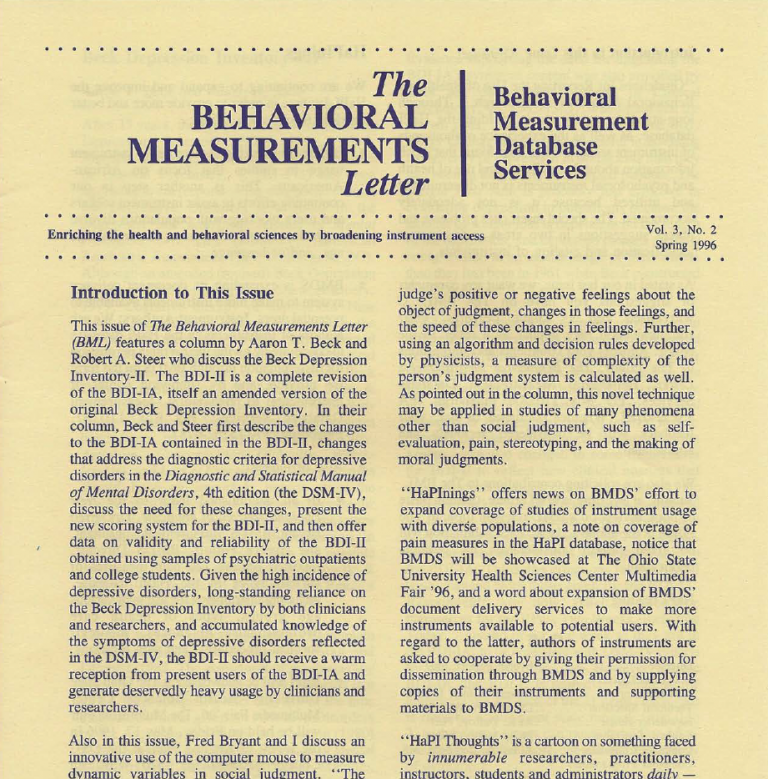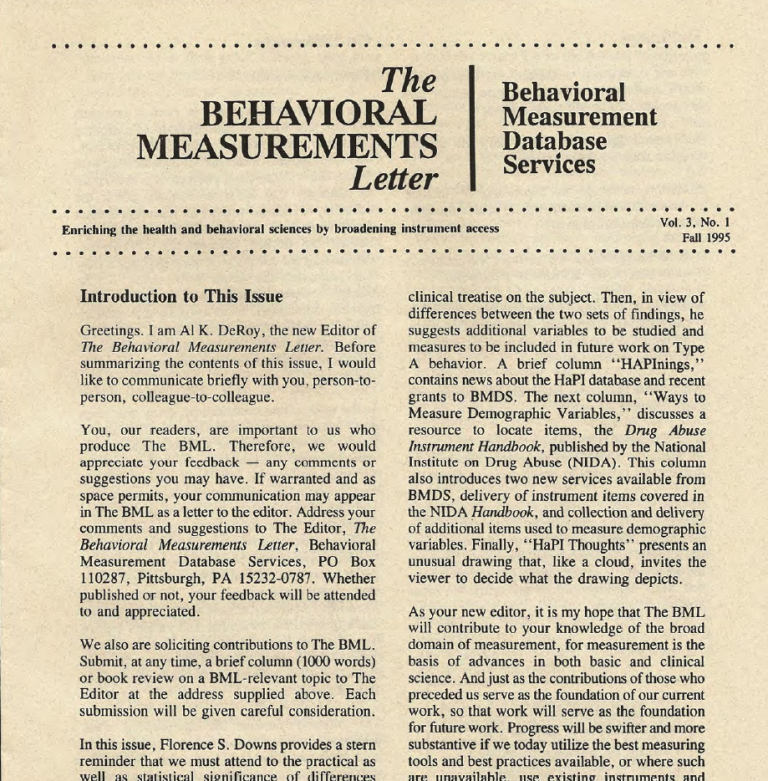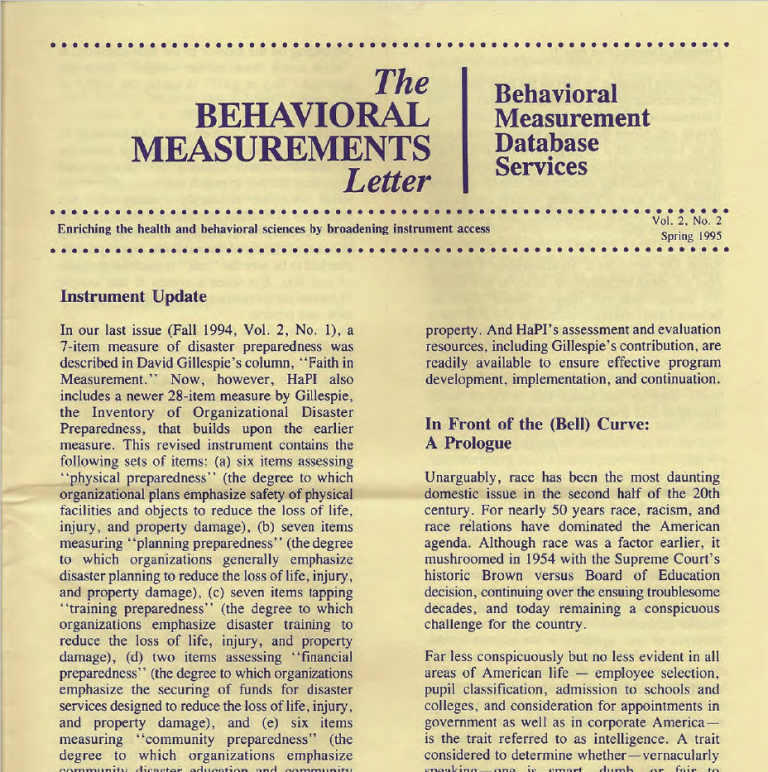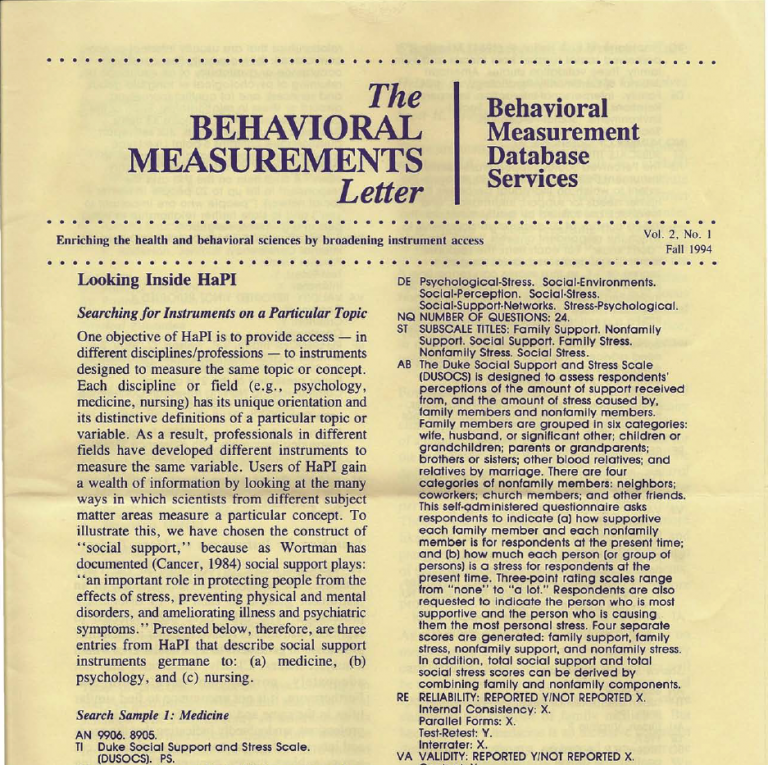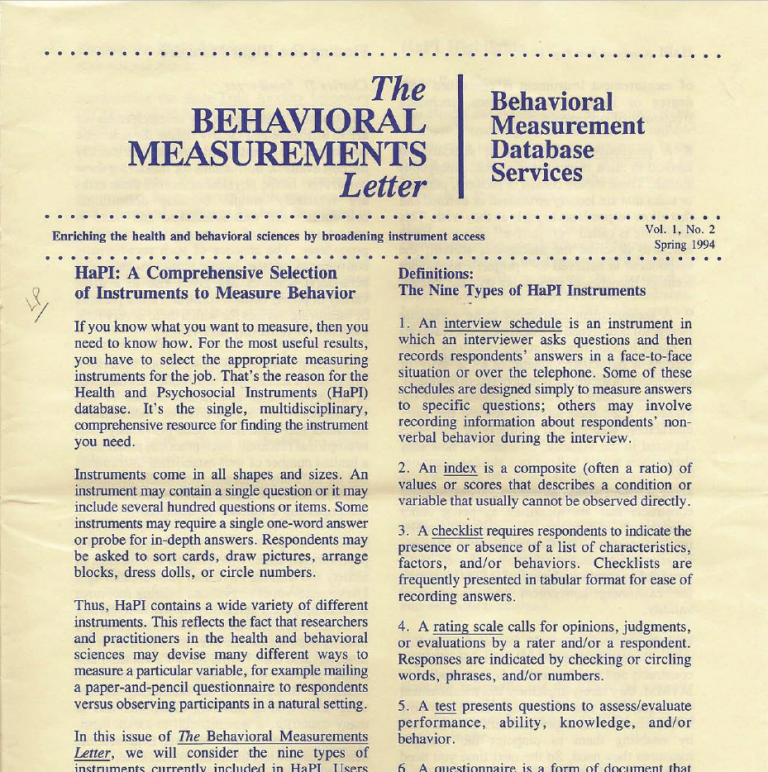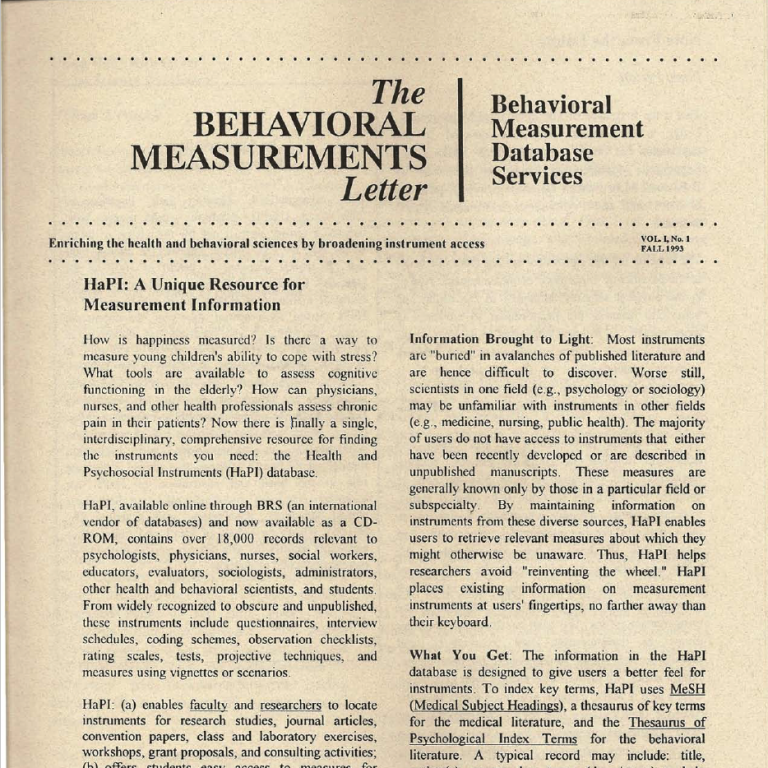Vol. 2, No. 1: Fall 1994
One objective of HaPI is to provide access – in different disciplines/professions – to instruments designed to measure the same topic or concept. Each discipline or field (e.g., psychology, medicine, nursing) has its unique orientation and its distinctive definitions of a particular topic or variable. As a result, professionals in different fields have developed different instruments to measure the same variable. Users of HaPI gain a wealth of information by looking at the many ways in which scientists from different subject matter areas measure a particular concept. To illustrate this, we have chosen the construct of “social support,” because as Wortman has documented (Cancer, 1984) social support plays: ”an important role in protecting people from the effects of stress, preventing physical and mental disorders, and ameliorating illness and psychiatric symptoms.” Presented below, therefore, are three entries from HaPI that describe social support instruments germane to: (a) medicine, (b) psychology, and (c) nursing.
Search Sample 1: Medicine
AN 9906. 8905.
Tl Duke Social Support and Stress Scale. (DUSOCS). PS.
AU Parkerson, George R., Jr.; Michener, James L.; Wu, Lawrence R.; Finch, James N.; Muhlbaier, Lawrence H.; Magruder-Habib, Kathyrn; Kertesz, Joseph W.; Clapp-Channing, Nancy; Morrow, Diana S.; Chen, Anthony L.T.; Jokerst, Elizabeth.
YR 1986.
SO Parkerson, G.R., Jr., Michener, J.L., Wu, L.R., Finch, J.N., Muhlbaler, L.H., Magruder-Habib, K., Kertesz, J.W., Clapp-Channing, N., Morrow, D.S., Chen, A.L.T., & Jokerst, E. (in press). Associations among family support, family stress, and personal functional health status. Journal of Clinical Epidemiology.
DE Psychological-Stress. Social-Environments. Social-Perception. Social-Stress. Social-Support-Networks. Stress-Psychological.
NQ NUMBER OF QUESTIONS: 24.
ST SUBSCALE TITLES: Family Support. Nonfamily Support. Social Support. Family Stress. Nonfamily Stress. Social Stress.
AB The Duke Social Support and Stress Scale (DUSOCS) is designed to assess respondents’ perceptions of the amount of support received from, and the amount of stress caused by, family members and nonfamily members. Family members are grouped in six categories: wife, husband, or significant other; children or grandchildren; parents or grandparents; brothers or sisters; other blood relatives; and relatives by marriage. There are four categories of nonfamily members: neighbors; coworkers; church members; and other friends. This self-administered questionnaire asks respondents to Indicate (a) how supportive each family member and each nonfamily member is for respondents at the present time; and (b) how much each person (or group of persons) is a stress for respondents at the present time. Three-point rating scales range from “none” to “a lot.” Respondents are also requested to indicate the person who is most supportive and the person who is causing them the most personal stress. Four separate scores are generated: family support, family stress, nonfamily support, and nonfamily stress. In addition, total social support and total social stress scores can be derived by combining family and nonfamily components.
RE RELIABILITY: REPORTED Y/NOT REPORTED X.
Internal Consistency: X.
Parallel Forms: X. Test-Retest: Y.
Interrater: X.
VA VALIDITY: REPORTED Y/NOTREPORTED X.
Content: Y.
Criterion: X.
Construct: Y.
RF REFERENCES: X.
AT ANALYST: Dr. G. R. Parkerson, Jr., Department of Community & Family Medicine, Box 2914, Duke University Medical Center, Durham, NC 27710.
Search Sample 2: Psychology
AN 8699. 8909.
Tl Perceived Social Support From Family. (PSS-Fa). PS.
AU Procidano, Mary E.; Heller, Kenneth.
YR 1983.
SO Procidano, M.E., & Heller, K. (1983). Measures of perceived social support from friends and from family: Three validation studies. American Journal of Community Psychology, 11, 1-24.
DE Family. Interpersonal-Interaction. InterpersonalRelations. Social-Environment. Social Environments. Social-Perception. Social-Support-Networks.
NQ NUMBER OF QUESTIONS: 20.
ST SUBSCALE TITLES: X.
AB The Perceived Social Support From Family Instrument (PSS-Fa) is designed to measure the extent to which an individual perceives that his/her needs for support, Information, and feedback are fulfilled by family members. The PSS-Fa consists of 20 declarative statements to which the respondent answers “yes,” “no,” or “don’t know.” For each Item, the response indicative of perceived social support is scored as +1, so that scores can range from 0, indicating no perceived social support, to 20, indicating maximum perceived social support. The “don’t know” category is not scored. The PSS-Fa is a self-report questionnaire. Sample Items include: “Certain members of my family come to me when they have problems or need advice,” “I rely on my family for emotional support,” and “Members of my family are good at helping me solve problems.” A related instrument, Perceived Social Support From Friends (PSS-Fr), assesses the extent to which respondents perceive that their needs for support, information, and feedback are fulfilled by friends.
RE RELIABILITY: REPORTED Y/NOT REPORTED X.
Internal Consistency: Y.
Parallel Forms: X.
Test-Retest: Y.
Interrater: X.
VA VALIDITY: REPORTED Y/NOT REPORTED X.
Content: X.
Criterion: Y.
Construct: Y.
RF REFERENCES: Procidano, M.E. (in press). The nature of perceived social support. In C.D. Spielberger and J.N. Butcher (Eds.), Advances in personality assessment (Vol. 9). Hillsdale, NJ: Lawrence Eribaum Associates.
AT ANALYST: Dr. M. E. Procidano, Department of Psychology, Fordham University, Bronx, NY 10458.
Search Sample 3: Nursing
AN 8666. 8909.
Tl Tilden Interpersonal Relationships Inventory.
(IPRI). PS.
AU Tilden, Virginia P.
YR 1987.
SO Tilden, V.P., & Galyen, R.D. (1987). Cost andconflict: The darker side of social support. Western Journal of Nursing Research, 9, 9-18.
DE Adults. Interpersonal-Interaction. lnterpersonalRelations. Social-Environments. Social-Support-Networks.
NQ NUMBER OF QUESTIONS: 39.
ST SUBSCALE TITLES: Social Support. Reciprocity. Conflict.
AB The Tilden Interpersonal Relationships Inventory (IPRI) measures three dimensions of social network functions and interpersonal relationships: (a) social support (the perceived availability or enactment of helping behaviors by persons with whom one is engaged in relationships that are usually informal or noncontractual); (b) reciprocity (the perceived occurrence or availability of an exchange or returning of psychological or tangible goods and services); and (c) conflict (perceived discord or stress In relationships). Each of the above three subscales contains 13 items. Designed for use with adults, this self-report questionnaire contains 5-point Likert-type scales ranging from “strongly disagree” to “strongly agree” or from “never” to “very often.” A final item on the IPRI asks the respondent to list up to 20 people in his/her social network (“people who are important to you”) and to state his/her relationship to each person e.g., friend, neighbor).
RE RELIABILITY: REPORTED Y/NOT REPORTED X.
Internal Consistency: Y.
Parallel Forms: X.
Test-Retest: Y.
Interrater: X.
VA VALIDITY: REPORTED Y/NOT REPORTED X.
Content: Y.
Criterion: Y.
Construct: Y
RF REFERENCES: Tilden, V.P., Nelson, C., May, B.A., & Mejo, S. (1988, May). Construct validation of the Tilden Interpersonal Relationships Inventory. Paper presented at the 21st annual Communicating Nursing Research Conference, Western Society for Research In Nursing, Salt Lake City, UT. Tilden, V.P. & Stewart, B.J. (1985). Problems in measuring reciprocity with difference scores. Western Journal of Nursing Research, 7, 381-385.
AT ANALYST: Dr. V.P. Tilden, Mental Health Nursing, The Oregon Health Sciences University, 3181 S.W. Sam Jackson Park Road, Portland, OR 97201.
Searching for Instruments on Many Topics
To illustrate scope of coverage in the HaPI database, we present titles (and authors) of an instrument generic to each of 13 disciplines/professions. The titles have been selected to represent instruments related to either a discipline/profession in general or to a particular area within a subject matter. Clearly, these titles may not adequately portray an area’s content. Furthermore, it is not uncommon to find similar titles in the same and/or in different disciplines/professions, undoubtedly indicating that the needs and interests of researchers and practitioners cut across subject matter content. The following listing captures this wide spectrum of instruments that can now be retrieved through HaPI.
Public Health
Tl Occupational Health Questionnaire: Indoor Air Quality.
AU Brown-Skeers, Vicki M.
Communication
Tl Communication Styles Q-Set.
AU Stephen, Timothy D.; Harrison, Teresa M.
Psychology
Tl Cognitive Bias Questionnaire.
AU Krantz, Susan E.; Hammen Constance L.
Organizational Behavior
Tl Job Motivation Inventory.
AU Kahoe, Richard Dean.
Nursing
Tl Gortner Values in the Choice of Treatment Inventory.
AU Gortner, Susan R.
Medicine
Tl Arthritis Impact Measurement Scales. (AIMS).
AU Meenan, Robert F.; Mason, John H.; Kazis, Lewis
E.; Anderson, Jennifer J.
Sociology
Tl Political Behavior.
AU Rasinski, Kenneth A.
Physical Education
Tl Athletic Injury Questionnaire – Athlete Assessment.
AU Crossman, Jane; Jamisson, John.
Social Work
Tl Basic Shelter Interview Schedule.
AU Ropers, Richard H.; Boyer, Richard.
Psychiatry
Tl Eating Disorder Inventory. (EDI).
AU Garner, David M.; Olmsted, Marion P.; Polivy, Janet.
Human Resources
Tl Office Attitude Questionnaire.
AU Biberman, Gerald.
Gerontology
Tl Elders Life Stress Inventory.
AU Aldwin, Carolyn M.; Levenson, Michael R.;
Spiro, Avron, Ill; Bosse, Raymond.
Dental Medicine
Tl Dental Pain and Stress Measure – Tooth Extraction Form.
AU Chaves, John F.; Brown, Jude M.
These diverse titles reflect the broad coverage in HaPI of instruments in the health and behavioral sciences. The rich diversity of information on measurement instruments makes HaPI a unique resource for efficient retrieval of hard-to-find measurement information. In addition, the access provided by HaPI to instruments constructed to measure the same concept (e.g., social support, quality of life) encourages ongoing development and validation, which is, after all, the sine qua non of sound measurement and, therefore, of effective research.
Linda Perloff, Editor
Read additional articles from this newsletter:
Clinical Measurement for Primary Care
